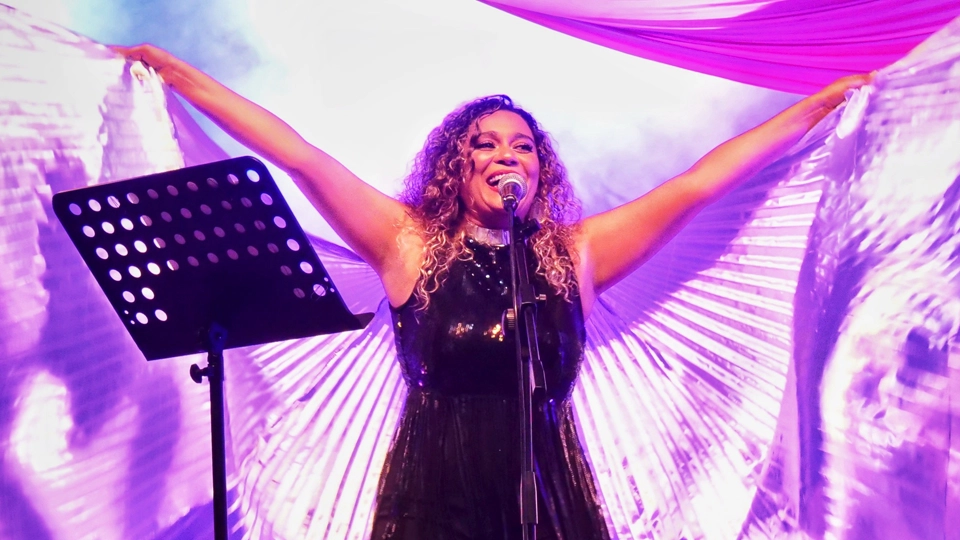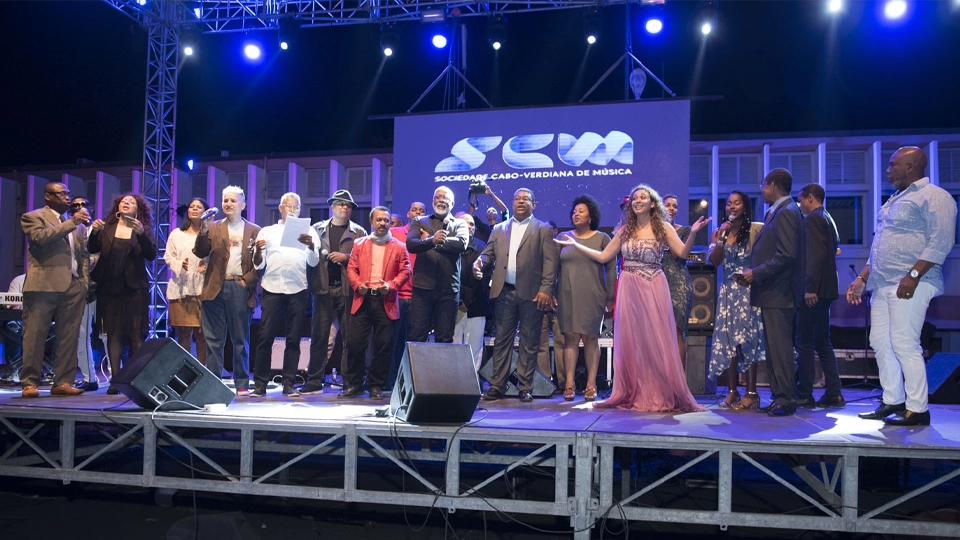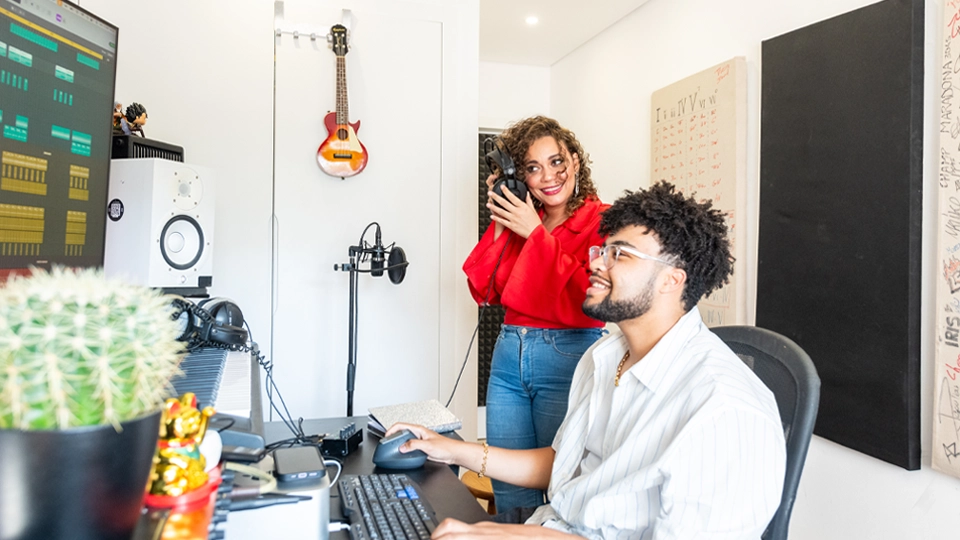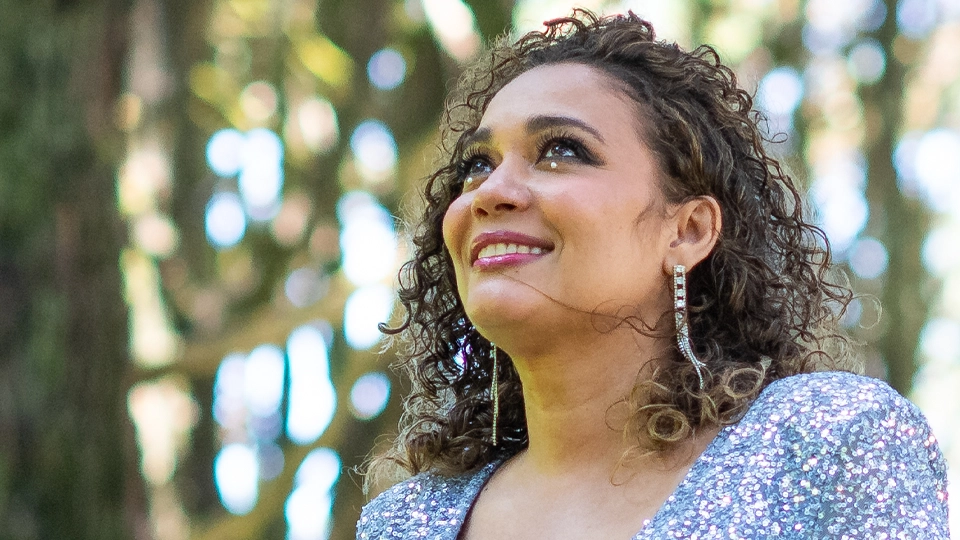Solange Cesarovna is one of Cabo Verde’s most accomplished musical ambassadors. The singer and songwriter has represented the West African archipelago on stages everywhere from Brazil to the Vatican. In 2013, she co-founded the Cabo Verde Music Society, the country’s first collective management organization (CMO) exclusively to protect music intellectual property (IP). Today, it has more than 1,700 members – not bad for a nation of little more than half a million people. After serving back-to-back terms as the Society’s president, Cesarovna stepped down in late 2023 in order to refocus on writing and recording. She talks to WIPO Magazine about the importance of managing IP and the difficulties in setting up a CMO in small countries, the resources available to creators, and what’s next for her career.

Tell us about Cabo Verde.
Cabo Verde is a small Portuguese-speaking country of 10 beautiful islands in the Atlantic Ocean off the coast of West Africa. We are proud to think of ourselves as a country of music. We would all embrace music as a career – if only it were that easy [laughs]!
I fell in love with music when I was 5 or 6 years old. From an early age, I would find public spaces, such as my island of São Vicente and the city of Mindelo, where I could perform or listen to music. After winning a prize at the age of 7, I was invited to perform on the islands. When I was 8, I was invited to open Baía das Gatas, the biggest festival in Cabo Verde.
“We could not understand ourselves without music.”
Music, and especially themorna, is a big part of Cabo Verde’s national identity. What does the morna mean to you?
Morna is the best way to share how we feel, our values and how we connect to people and the world. When a child is born, we receive it with morna. We go to the family’s house to protect the child by singing. The morna that we sing, “Ná, ó Menino Ná”, was written by one of Cabo Verde’s greatest composers and poets, Eugênio Tavares.
You recorded the work of Tavares on your 2017 album, Mornas. Did using his lyrics pose any challenges?
With Tavares, it was easier because it’s in the public domain. Cabo Verde protects the musical works and copyright of songwriters and composers for 50 years after their death. When I recorded the work, it was part of a project celebrating Tavares’ 150th birthday run by the publisher Edições Artiletra. The idea behind the project was to support the candidacy of morna to be placed on the United Nations Educational, Scientific and Cultural Organization (UNESCO) Representative List of the Intangible Cultural Heritage of Humanity, which was approved in 2019.
Tavares worked not just as a poet, songwriter and composer but also as a journalist and politician. It takes a long time to organize these things. We had to make sure that we had the manuscript and lyrics he wrote with his own hands. That way, we could recreate the songs as Tavares wrote them.
Normally, I don’t think it is difficult to obtain a license. Of course, if the song is an original, the process is different, because only the creator has the right to share their creation for the first time. Still, this procedure should not be difficult anymore, because we have the Sociedade Cabo-verdiana de Música (SCM, Cabo Verde Music Society), which facilitates dialogue between creators, artists, songwriters, producers, labels, publishers and players.

The Cabo Verde Music Society is the CMO that you co-founded in 2013. How did you come to establish it?
We believe that music is the most amazing ambassador for our country around the world, and we could not understand ourselves without it. Unfortunately, until about 12 years ago, people in the music business were unable to receive compensation for their work because we had no professional system.
In 2013, we were in the cemetery, because Zé Henrique, one of the great songwriters in Cabo Verde, had passed away. I had been working with him and Kim di Santiago, another songwriter whom I admire, on my new album. Kim and I decided there and then that we would act. Zé Henrique sadly left us, but we vowed to fight for our dream: that no songwriter, composer or artist in Cabo Verde should die without the chance to defend their copyright.
“We were trying to increase our membership at concerts, at airports, in the street, wherever we could.”
In the music industry, artists often blame the system for poor remuneration. Would you say that it’s partly up to the artists to fix this?
Yes, but not just us. You also need to understand who the other stakeholders are, how they can help, and the obligations of the creators and the public sector.
You have to get advice from international organizations working in the field, because that will reassure you that you’re not pursuing some crazy dream, and that the dream and is 100 per cent achievable if creators act. But they need to study how the system works.
Let’s talk about the stakeholders.
We started the CMO before Cabo Verde even had a law allowing CMOs to exist and license on behalf of creators. There was a copyright law that gave creators the exclusive rights of use to the musical work. The same law says that, if creatives themselves are unable or do not wish to do it, they may ask a CMO to help distribute their works and authorize it to represent them in the management of the works. But they were not able to say what a CMO does or what rights it has. Everything started happening after we set up the Cabo Verde Music Society.
What are the most important things you’ve learned about setting up a CMO in a small country?
Once you set it up, you need to increase its membership numbers and get active members who create and record a lot. Your country has to understand that your project collectively represents some of the greatest names in your sector.
At first, we went to concerts and performances to see our colleagues and tell them that we had created the Cabo Verde Music Society. Our mandate was not digital, it was physical [laughs]. We were trying to increase our membership at concerts, at airports, in the street, wherever we could.
After that, you need to make sure that the Government understands what a CMO is. Without the legal framework you need to operate properly in your territory, you won’t have a deal. We wanted to make sure that it would be a priority for the Minister of Culture too. It was necessary for the older system to invest in the new laws we needed, for the country as a member state of the World Intellectual Property Organization (WIPO) to adopt the treaties, and for us to change our law in line with the treaties in order to make sure that we work not just in our territory but on an international level. We also had to make sure internally that we understood what the CMO does.
“You need amazing documentation and a strong distribution system.”
How did you do that?
We reached out to other CMOs in our region, including the Southern African Music Rights Organization (SAMRO) and the Composers, Authors and Publishers Association (CAPASSO) in South Africa. In the Portuguese-speaking countries, we received enormous help from the Portuguese Society of Authors (SPA) and also went to the Society of Authors, Composers and Publishers of Music (SACEM) to understand how they operate, and to Brazil because we cover related rights too. The Cabo Verde Music Society covers all areas of copyright in the music sector. We manage copyright for creators, songwriters, composers and publishers, but also for performers and producers. In Europe, normally there are two CMOs, one for creators and another for performers. We are a small country, so we bring them together. So does Brazil.
We also became a member of the International Confederation of Societies of Authors and Composers (CISAC), to make sure that we would be able to cover the licensing and representation of our members and musical works on a global scale. Today, through reciprocity agreements with sister societies, we represent more than a million rights holders and a music catalog of over 30 million works and sound recordings.

You need amazing documentation and a solid distribution system with good data and transparency.
We received strong support from WIPO, which developed the WIPO Connect system in Portuguese and allowed us to implement it in the Society. The IT solution became the first technological system for documenting and distributing copyright royalties in Cabo Verde, ensuring that collected royalties were properly paid to their rightful owners. This achievement took place at the height of the COVID pandemic and represented a major milestone for Cabo Verdean musicians.
Looking at the creative space and IP system at the moment, what are the challenges for 2025?
The challenge is still to set up a good collective management sector in the least developed countries. It seems like, in the near future, the whole world will be focusing on Africa and Latin America. These big continents have a lot of young, wonderful musicians, creators and songwriters. You can feel that there is a huge opportunity. The best way to take advantage of this opportunity is to get organized, with the help of international stakeholders such as WIPO, CISAC and other federations that represent creators globally. The support of international organizations that can also lobby governments is fundamental.
“It’s inspiring me to create more music, because I think my country is more ready to understand intellectual property.”
Let’s talk about CLIP, the free knowledge platform launched by WIPO and the Music Rights Awareness Foundation.
CLIP gives all the players in the music ecosystem a way to learn. You can empower creators to learn what to do if they don’t have the frameworks in their own country. If they do, that’s wonderful, and they can be empowered to play their role in the best way they can, because creators have rights, but we also have responsibilities.
When we create a song, we want to put together the best team. In the same way, we need to put our best efforts towards managing our IP.
What I find inspiring about CLIP is that it is peers, other creators, talking about subjects that we think of as very complex, such as identifier codes. You learn why they are important, and about standard contracts that you should sign. There is even a huge glossary in the language of the business of music.
What’s next for you in your musical career?
I’m waiting for an inspiring moment that will allow me to share my new musical works and recordings. I ended my mandate as president of the Cabo Verde Music Society in 2023 and came back to songwriting – it’s quite difficult finding a good balance between being a CMO president and being creative.

Was it worth it?
We had the opportunity and the challenge to create it from nothing. It’s a lot of work. It’s a lot of learning. It’s a lot of experimentation. It’s a lot of sharing. It’s a lot of time. But I’m so happy that the system is working.
This is a huge change in my country. It’s inspiring me to create more music, because I think my country is more ready to understand IP. My colleagues are benefiting from the system and I will benefit from the system as I never did before.
What is also true is that my passion for copyright and for IP management has increased 100 per cent. I want to continue serving this sector. I want to continue learning.
This interview has been edited and condensed from two conversations.

